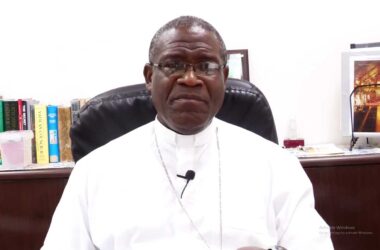
(Hons), BVC, LL.M, P.C.H.E
IT was a pleasure to interview former Deputy Registrar, Ms. Agnes Actie. Master Actie is the new Master of the High Court, for civil matters.
Ms. Actie joined the Public Service in 1982, and worked in various departments. She also worked with the police through the Licensing and Immigration department.

Ms. Actie’s decision to become a lawyer stemmed from her dissatisfaction at being just an ordinary civil servant. She completed her paralegal studies at the Sir Arthur Lewis Community College. She described the course as a grueling course because of the daily commitment of classes while in full-time employment. It was a two year part-time course. Ms. Actie recalled that fourteen persons started the course but only four completed it. She went on to to complete a two year certificate in Public Administration before pursuing her law degree at the University of the West Indies. (Her first year was done at the UWI Centre, the Morne part-time and then on to Cave Hill Campus in Barbados.)
Ms. Actie was called to the Bar in October 1999. She had worked at the Land Registry for a number of years, so when she returned to Saint Lucia, she was offered the position at the Ministry of Physical Development and Finance as legal officer for the Ministry of Finance, advising on insurance matters and writing opinions for the Ministry. She also worked in the Attorney General’s chambers, as Crown Counsel and was appointed Deputy Registrar of Lands when the Deputy Registrar of Lands, Leroy Frederick suddenly passed away in office in 2001.
She became the Acting Registrar of Lands and then took a position with the Commonwealth Secretariat in the Republic of Trinidad and Tobago for two years. She returned to Saint Lucia and was Registrar of Lands until 2007. Then she took up her more recent post as Deputy Chief Registrar of the Eastern Caribbean Supreme Court of Appeal. Ms. Actie was appointed a Master of the High Court on 1st March 2015.
At the time of the interview, Ms. Actie was transitioning between jobs as Deputy Chief Registrar to Master of the High Court. When asked what her position as Deputy Chief Registrar working as part of a team for the Court of Appeal, she had direct supervision of the Court of Appeal Registry which had many functions including: collating documents for all of the appeals in all wine jurisdictions; ensuring they are properly filed, they were accepted via hard copy, fax or email. A file was created for each appeal filed. The Court of Appeal as an itinerant court schedules court hearings in the various jurisdictions and also conducts hearings by video conference. The records for each appeal are prepared for the Justices of Appeal. The Registry ensures that the appeals are ready to proceed in compliance with the Civil Procedure Rules (CPR). There is continuous case management for matters from all nine jurisdictions to obtain information such as time estimates of each matter before the Court of Appeal; whether or not there was a need for any possible adjournments etc all in an effort in getting matters ready for hearings. Notices are sent to the parties for all matters listed for Full court hearings as well as appeals of chamber hearings. Certificates of results and a digest of the matters heard are also kept, and outcomes entered in the electronic database. Notices for delivery of judgments indicating the date and place of delivery are prepared; and at all times, there had to be compliance with Civil Procedural Rules (CPR) and practice directions ready for appeal. Chamber hearings are held once a month by a single judge presiding.
Ms. Actie also outlined some of the challenges facing her department. From any of the nine islands, parties would call in to ask about their matters and the department was not always in a position to respond as there are occasions where documents or appeals were filed in their jurisdiction but had not reached the Court of Appeal head office. On occasions, supporting documents for an upcoming matter took a long time to be submitted to the department. All of these challenges could be quite frustrating for those responsible for preparing the files for the judges to read in preparation for the hearing or determination on paper.
Ms. Actie had accepted the appointment of Master of the High Court with responsibilities in Saint Lucia and two other islands. She described herself as a very proactive person, who had had the experience of acting as a Master on many occasions.
Ms. Actie said that she intended to help ‘clean up’ the system and expedite the matters numerous matters lingering and clogging up the court system. There would be continued status hearings on outstanding matters ensured to meeting the overriding objectives of CPR. Further she indicated that staff training was critical at the various registries. She expressed an interest in meeting with the Bar Association. As a trained mediator with the OECS and Singapore, she felt that mediation should be compulsory as it would benefit everyone and the society on the whole. In the current economic climate, she felt that mediation would be an invaluable resource to bring harmony to the community, as it had done in Singapore.
According to Ms. Actie, the staff in the registries were overloaded with work and overwhelmed. Further, the High Court building on Peynier Street is simply unsatisfactory. This has been echoed by the Bar Association of Saint Lucia, and plans are afoot to find more suitable accommodation for the courts.
In her view, the Caribbean Court of Justice was capable of replacing the Privy Council as the final appellate court. There was no doubt that judges were competent with the only apprehension was the possibility of interface with judges socially, but she said that this would not be a good reason without evidence.
On enquiry as to the difference between the English and Caribbean trained lawyers Ms Actie noted that in the British Virgin Islands (BVI), most lawyers in practice were English trained and more proactive. Based on a jurisdiction with peculiar legislation for example Saint Lucia, law and practice favoured the UWI trained lawyer. Otherwise, she did not see any major difference, and emphasized that it had more to do with the individual’s aptitude than where the lawyer was trained.
To youngsters interested in studying law, she advised:
“Don’t just go into it for image or to say I am a lawyer; you have to be dedicated and committed to the practice of law. It is serious and quite demanding. Don’t go into it just for the money, but to uphold the integrity of the profession and the rule of law.”
Ms. Trudy O. Glasgow is a practising attorney at the law firm Trudy O. Glasgow & Associates, a court-appointed mediator and author in Saint Lucia (and has also taught law at University level in the UK)*. She is also the Vice President of the Bar Association of Saint Lucia.
This column is for general use only, for advice specifically for your case, please see your lawyer
Share your thoughts and comments: you are invited to email me at trudyoglasgow@lawyer.com


![Simón Bolívar - Liberator of the Americas [Photo credit: Venezuelan Embassy]](https://thevoiceslu.com/wp-content/uploads/2025/12/Simon-Bolivar-feat-2-380x250.jpg)






